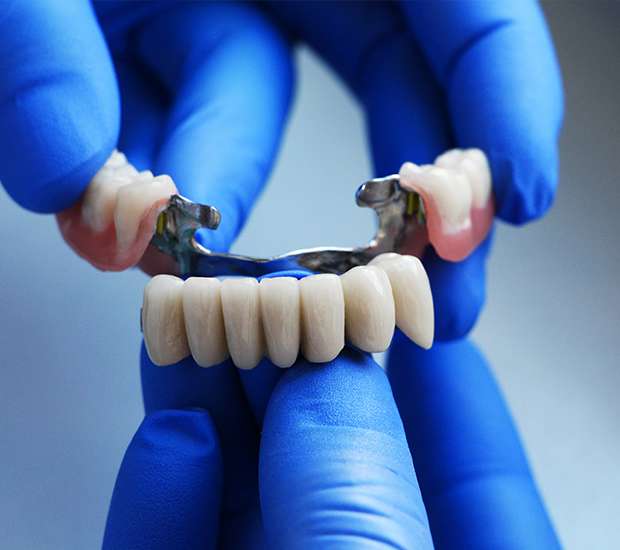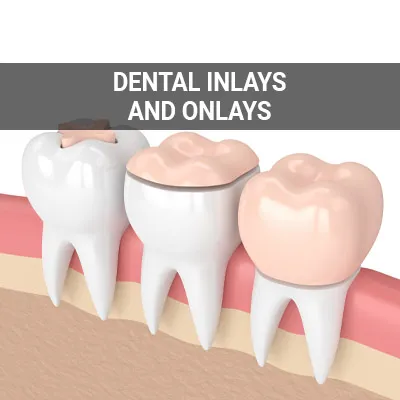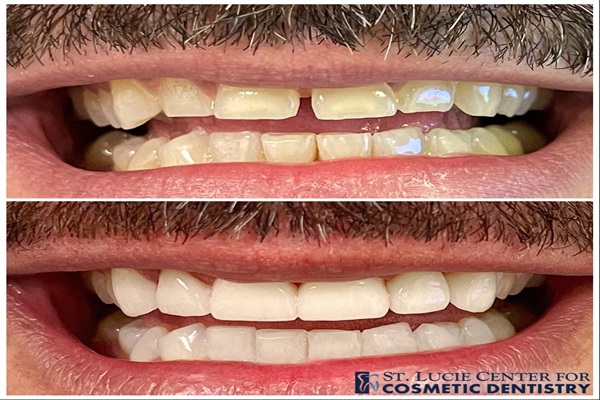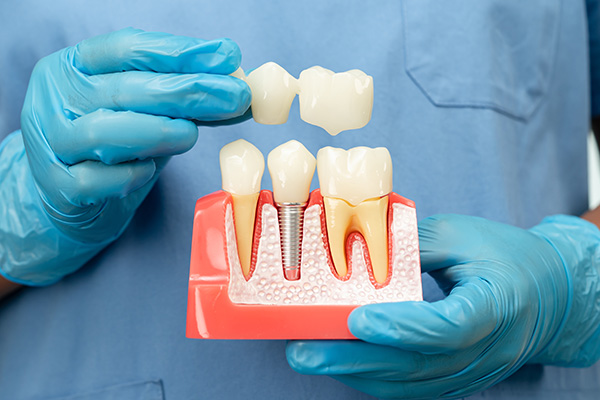Dental Bridges Port St. Lucie, FL
Replacement teeth such as dental bridges help return the form and function of the mouth after a tooth extraction or other kind of tooth loss. Effective treatment and dental care after tooth loss can help patients enjoy more natural eating and speaking. A dental bridge is a type of replacement tooth that fills in the gap between natural teeth, often by connecting to the remaining teeth on either side of it.
Dental bridges are available at St Lucie Center for Cosmetic Dentistry in Port St. Lucie and the surrounding area. If you have missing teeth or are expecting to undergo an extraction, do not wait to address the problem. A dental bridge may not only restore the appearance of the smile but also make daily life more comfortable. Call (772) 242-4124 to schedule an appointment and learn more.
Understanding What a Dental Bridge Can Do for You
A dental bridge is a partial set of replacement teeth, usually made from porcelain that looks and feels like natural teeth. There are several types of dental bridges, but most connect to the abutting natural teeth to hold them in place. This helps prevent the rotating and shifting that can be brought on by gaps in the mouth left by missing teeth. Bridge work is typically designed to be a permanent addition to the mouth and is not removable. Dental bridges require healthy surrounding teeth or implants to have enough bone support.
With proper care, dental bridges can last for close to ten years. Dentists recommend patients brush and least twice daily using a soft-bristled toothbrush. It is important to floss daily around the teeth and bridge and use an antiseptic mouth rinse. Your dentist may recommend a proxabrush to clean under your bridge. Patients who have bridgework are also advised to avoid tobacco products and hard sticky items like caramel.
“A dental bridge is a partial set of replacement teeth, usually made from porcelain that looks and feels like natural teeth.”
Candidates for Dental Bridges
To receive a dental bridge, the patient needs to have some remaining natural teeth. In general, dental bridges are appropriate for cases of one or a few missing teeth. If the patient is missing a large portion of the arch, another treatment may be preferable.During a consultation, we can go over possible options and see which one will be most effective for the patient.
Since it can take up to six months for the gum to heal completely, an individual may experience a delay in receiving a dental bridge. Additionally, a bridge may not be an option if there are insufficient bone and tooth matter to support it. St Lucie Center for Cosmetic Dentistry can evaluate whether a patient is a candidate for this treatment. In some cases, a dental bridge may only be part of a treatment plan or smile makeover.
“In general, dental bridges are appropriate for cases of one or a few missing teeth.”
Types of Dental Bridges
There are four main types of dental bridges, and choosing the right one for any particular person depends on the individual's oral health and needs. Here is some key information about each type:
- Traditional. This type of bridge attaches to crown-covered teeth or implants on both sides. They usually consist of either ceramic or porcelain attached to metal. Recently, the use of a ceramic called zirconia has become popular due to this material’s durability and natural look.
- Maryland. This bridge, also referred to as a resin-bonded bridge, is supported by a flat meta or porcelain “wing” that is attached to the backs of abutting teeth. It is less sturdy than traditional bridges. For this reason, it usually replaces front teeth, which take less strain.
- Cantilevered. This bridge only has support on one side, which places a lot of strain on the one supporting tooth. Therefore, dentists avoid placing it in high-stress areas such as the back of the mouth.
- Implant-supported. This type of bridge is true to its name. The bridge is supported by implants that are already present in the jaw bone. They are considered to be the strongest, most stable type of bridge.
“There are three main types of dental bridges, and choosing the right one for any particular person depends on the individual’s oral health and needs.”
Check out what others are saying about our dental services on Yelp: Dental Bridges in Port St. Lucie, FL
Dental Bridges Versus Dentures
One alternative to a dental bridge is a set of partial dentures. These can replace one or a few teeth similarly. However, unlike dental bridges, the dentures are not permanently placed but are removed for cleaning and sleeping.
Eating and speaking can feel more comfortable with dental bridges than with dentures, as dental bridges are more firmly rooted in place. Furthermore, you must remove dentures to clean them, whereas you can brush dental bridges like natural teeth. However, according to the American Dental Association, cleaning dental bridges may require extra care to ensure the health of the gum beneath the replacement teeth.
“Dental bridges are more firmly rooted in place than dentures, which can make eating and speaking easier.”
Questions Answered on This Page
Q. Am I a good candidate for a dental bridge?
Q. What are the differences between dental bridges and dentures?
Q. What are the benefits of dental bridges?
Q. What types of dental bridges are available?
People Also Ask
Q. How can a dentist replace missing teeth?
Q. What is restorative dentistry?
The Benefits of Dental Bridges
Dental bridges can be an effective treatment for missing teeth. Our team recommends this option to patients who are candidates and want to restore the form and function of their mouths. These are a few of the benefits:
- Emulate Natural Teeth: The porcelain teeth on a dental bridge look, feel, and function like natural teeth. They are stable in the mouth. Therefore, they are similar to natural teeth when eating and speaking.
- Allow Brushing: Patients can clean dental bridges in the mouth, unlike with removable dentures, meaning they can brush and floss like normal. Maintaining this familiar process can make care more manageable.
- Provide Value: Compared to implants, dental bridges are less expensive. They may cost more than removable dentures. Many patients find that they provide a healthy balance between cost and effectiveness.
- Perform Effectively: Missing teeth may produce embarrassment and make speaking and eating more challenging. They may also slowly erode the jawbone over time. A dental bridge is an effective way to overcome these issues.
“Dental bridges can be an effective treatment for missing teeth.”
Frequently Asked Questions
Q. How is a dental bridge different from dentures?
A. Dentures require removal every day, while a bridge stays in the mouth permanently for the duration of its lifespan. On the one hand, bridges tend to offer a better fit and a more natural feeling. On the other hand, fitting the dentures does not require additional procedures such as a crown or implant placement.
Q. How long can I expect my dental bridge to last?
A. Dental bridges usually last between 10 and 15 years. Taking good care of the bridge and seeing a dentist on a regular basis can extend this period further.
Q. Is it normal to have tooth sensitivity after getting a dental bridge?
A. Tooth sensitivity is common after bridge placement. It usually goes away after a few weeks. In the meantime, it can help to avoid very hot or cold foods. The American Dental Association also recommends limiting acids, which can be in some types of mouthwash. Ask a dentist about alternative products.
Q. When do I need to see a dentist about problems with my dental bridge?
A. Some discomfort immediately after placement is usually normal; however, contact a dentist if pain or sensitivity persists or worsens. Damage to the bridge or crowns also needs prompt, professional attention.
Q. Why does my dental bridge keep coming loose?
A. If a dental bridge keeps loosening or falling out, the most common reason is decay in the supporting teeth. Other causes could include gum disease. Whatever the reason, a loose bridge is an important reason to call our office right away.
Dental Terminology
Helpful Related Links
- American Dental Association (ADA). Glossary of Dental Clinical Terms. 2024
- American Academy of Cosmetic Dentistry® (AACD). Home Page. 2024
- WebMD. WebMD’s Oral Care Guide. 2024
About our business and website security
- St Lucie Center for Cosmetic Dentistry was established in 1984.
- We accept the following payment methods: American Express, Cash, Check, Discover, MasterCard, and Visa
- We serve patients from the following counties: St. Lucie County
- We serve patients from the following cities: Port St. Lucie, River Park, White City, Fort Pierce, Fort Pierce South, St Lucie West, Tradition, Palm City, Jensen Beach, and Stuart
- Norton Safe Web. View Details
- Trend Micro Site Safety Center. View Details
Back to top of Dental Bridges















